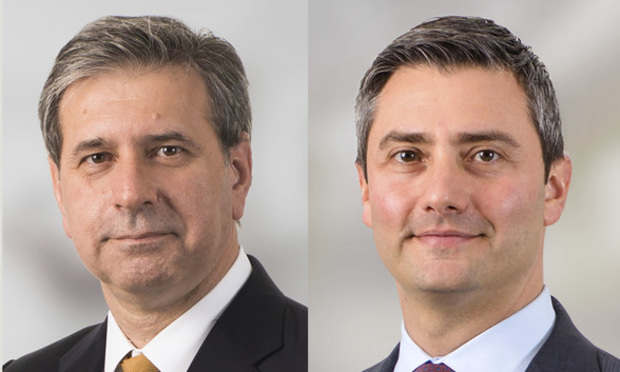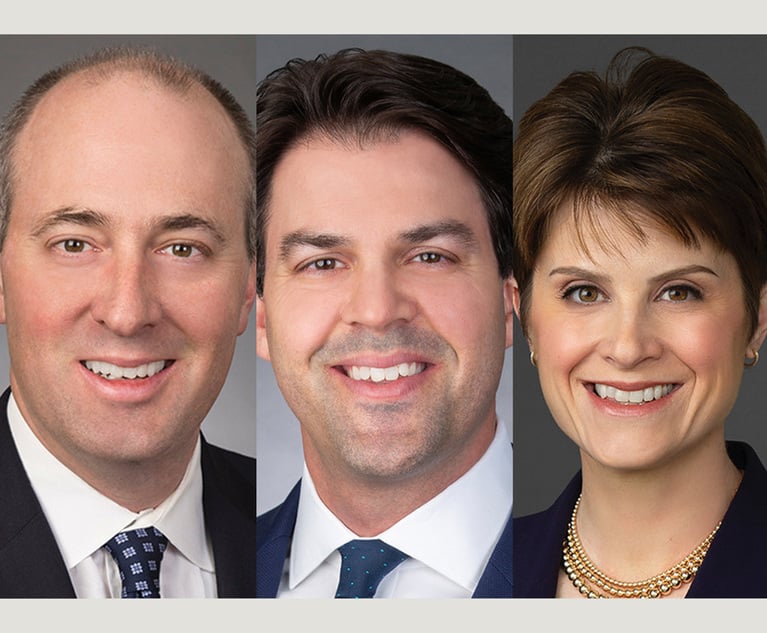Daily Dicta: Clifford Chance Team Readies for Trial in High-Profile FCPA Case
Seven years after DOJ prosecutors charged Lawrence Hoskins with violating the Foreign Corrupt Practices Act, his case is going to trial in federal court in Connecticut.
October 24, 2019 at 12:01 AM
5 minute read
 Clifford Chance partners Christopher Morvillo, left, and Dan Silver, right.
Clifford Chance partners Christopher Morvillo, left, and Dan Silver, right.
On a basic level, the alleged misconduct of Lawrence Hoskins—a British citizen who worked in Paris for a French multinational and supposedly approved the payment of bribes to officials in Indonesia—seems like it's…how can I put this? Not our problem.
Surely the Justice Department has other priorities—cases that involve, say, U.S. citizens or U.S. companies or things that happened in the United States?
Or not. Seven years after DOJ prosecutors charged Hoskins with violating the Foreign Corrupt Practices Act as well as money laundering, his case is going to trial on Monday in federal court in Connecticut.
The closely-watched case has already made new law. The U.S. Court of Appeals for the Second Circuit in an interlocutory appeal last year dealt a setback to prosecutors, reining in the reach of the FCPA when it comes to foreign nationals and foreign entities.
The ruling won Hoskins' lead lawyer, Clifford Chance partner Christopher Morvillo, Litigator of the Week honors last year. The team from Clifford Chance also includes partner Dan Silver.
But the appellate decision wasn't the end of the case. Prosecutors including Daniel Kahn, David Novick and Lorinda Laryea have a narrower path to conviction, but they're not backing down.
According to the indictment, when Hoskins was senior vice president for the Asia region at French multinational engineering company Alstom S.A., he approved payments to two consultants. He allegedly knew that a portion of the money would go to Indonesian officials "in exchange for their influence and assistance" in awarding a $118 million contract to provide power-related services to the citizens of Indonesia.
Prosecutors said the alleged bribery scheme centered on Alstom's American subsidiary, Alstom Power, Inc., headquartered in Connecticut—providing the tenuous U.S. connection.
But Hoskins never worked directly for Alstom Power, nor did he ever travel to the U.S. when the alleged bribery scheme was unfolding. Also his employer's stock has not been traded on any U.S. exchange since 2004. So how is Hoskins covered by the FCPA?
Morvillo last year explained to me that the feds claim Hoskins "was an agent of Alstom's U.S. subsidiary, and that he was therefore directly liable under the plain language of the FCPA. We challenged that agency allegation."
That is, could the government go after Hoskins for conspiracy and aiding and abetting theories of liability without first proving he was an agent of Alstom's Connecticut subsidiary?
On appeal, the Second Circuit panel in an issue of first impression said no. "The government may not expand the extraterritorial reach of the FCPA by recourse to the conspiracy and complicity statutes," the court held.
That means prosecutors at trial have to prove Hoskins was in fact an agent of Alstom in Connecticut—a much higher hurdle.
In dueling proposed jury instructions, both sides offered very different definitions of the term "agent," which is not spelled out by the FCPA.
The defense team argued that "agent" entails "the principal's right to control the agent"—including the agent's day-to-day work for the duration of the relationship.
For Hoskins to be considered an agent of Alstom in Connecticut, the Clifford Chance lawyers argued, the subsidiary had to "manifest its intent" that Hoskins be their agent and Hoskins had to say yes. Also, they said jurors should consider whether the Connecticut subsidiary had the right to supervise and assess him, approve or disapprove his actions, or terminate his services.
Prosecutors countered that there need be no formal agreement of agency. The arrangement "may be inferred circumstantially and from the words and actions of the parties involved," they said.
The government also argued that agency "need only be found in connection with the specific events of this case; in other words, one may be an agent for some business purposes and not for others."
To put it in real-world parlance—does agency mean you're in a committed long term relationship? Or is it more of a casual hook-up?
U.S. District Judge Janet Bond Arterton in a key ruling came down closer to the side of the government.
"An instruction that states that the principal must control the 'agent' might wrongly suggest to the jury that a higher level of generalized control over the agent is required," she wrote. Control need only be over "the actions of the agent taken on the principal's behalf," she ruled.
Still, she declined to lay out the actual instructions, writing that the specific directions "will be informed by the evidence at trial."
Stay tuned.
This content has been archived. It is available through our partners, LexisNexis® and Bloomberg Law.
To view this content, please continue to their sites.
Not a Lexis Subscriber?
Subscribe Now
Not a Bloomberg Law Subscriber?
Subscribe Now
NOT FOR REPRINT
© 2025 ALM Global, LLC, All Rights Reserved. Request academic re-use from www.copyright.com. All other uses, submit a request to [email protected]. For more information visit Asset & Logo Licensing.
You Might Like
View All
Litigators of the Week: A $604.9M Trade Secrets Verdict With a Big Assist From a Juror Question

Litigators of the Week: A Reset in the Fight Over Nearly $2B in Bonds Issued by Venezuela's National Oil Company

How Kirkland & Ellis Litigators Became a National Brand in Oil and Gas

Dorsey & Whitney Hits Back Against Complaint Claiming Firm Dragged Its Feet on Malpractice Suit Against Fellow Big Firm
Trending Stories
- 1'It's Not Going to Be Pretty': PayPal, Capital One Face Novel Class Actions Over 'Poaching' Commissions Owed Influencers
- 211th Circuit Rejects Trump's Emergency Request as DOJ Prepares to Release Special Counsel's Final Report
- 3Supreme Court Takes Up Challenge to ACA Task Force
- 4'Tragedy of Unspeakable Proportions:' Could Edison, DWP, Face Lawsuits Over LA Wildfires?
- 5Meta Pulls Plug on DEI Programs
Who Got The Work
Michael G. Bongiorno, Andrew Scott Dulberg and Elizabeth E. Driscoll from Wilmer Cutler Pickering Hale and Dorr have stepped in to represent Symbotic Inc., an A.I.-enabled technology platform that focuses on increasing supply chain efficiency, and other defendants in a pending shareholder derivative lawsuit. The case, filed Oct. 2 in Massachusetts District Court by the Brown Law Firm on behalf of Stephen Austen, accuses certain officers and directors of misleading investors in regard to Symbotic's potential for margin growth by failing to disclose that the company was not equipped to timely deploy its systems or manage expenses through project delays. The case, assigned to U.S. District Judge Nathaniel M. Gorton, is 1:24-cv-12522, Austen v. Cohen et al.
Who Got The Work
Edmund Polubinski and Marie Killmond of Davis Polk & Wardwell have entered appearances for data platform software development company MongoDB and other defendants in a pending shareholder derivative lawsuit. The action, filed Oct. 7 in New York Southern District Court by the Brown Law Firm, accuses the company's directors and/or officers of falsely expressing confidence in the company’s restructuring of its sales incentive plan and downplaying the severity of decreases in its upfront commitments. The case is 1:24-cv-07594, Roy v. Ittycheria et al.
Who Got The Work
Amy O. Bruchs and Kurt F. Ellison of Michael Best & Friedrich have entered appearances for Epic Systems Corp. in a pending employment discrimination lawsuit. The suit was filed Sept. 7 in Wisconsin Western District Court by Levine Eisberner LLC and Siri & Glimstad on behalf of a project manager who claims that he was wrongfully terminated after applying for a religious exemption to the defendant's COVID-19 vaccine mandate. The case, assigned to U.S. Magistrate Judge Anita Marie Boor, is 3:24-cv-00630, Secker, Nathan v. Epic Systems Corporation.
Who Got The Work
David X. Sullivan, Thomas J. Finn and Gregory A. Hall from McCarter & English have entered appearances for Sunrun Installation Services in a pending civil rights lawsuit. The complaint was filed Sept. 4 in Connecticut District Court by attorney Robert M. Berke on behalf of former employee George Edward Steins, who was arrested and charged with employing an unregistered home improvement salesperson. The complaint alleges that had Sunrun informed the Connecticut Department of Consumer Protection that the plaintiff's employment had ended in 2017 and that he no longer held Sunrun's home improvement contractor license, he would not have been hit with charges, which were dismissed in May 2024. The case, assigned to U.S. District Judge Jeffrey A. Meyer, is 3:24-cv-01423, Steins v. Sunrun, Inc. et al.
Who Got The Work
Greenberg Traurig shareholder Joshua L. Raskin has entered an appearance for boohoo.com UK Ltd. in a pending patent infringement lawsuit. The suit, filed Sept. 3 in Texas Eastern District Court by Rozier Hardt McDonough on behalf of Alto Dynamics, asserts five patents related to an online shopping platform. The case, assigned to U.S. District Judge Rodney Gilstrap, is 2:24-cv-00719, Alto Dynamics, LLC v. boohoo.com UK Limited.
Featured Firms
Law Offices of Gary Martin Hays & Associates, P.C.
(470) 294-1674
Law Offices of Mark E. Salomone
(857) 444-6468
Smith & Hassler
(713) 739-1250






